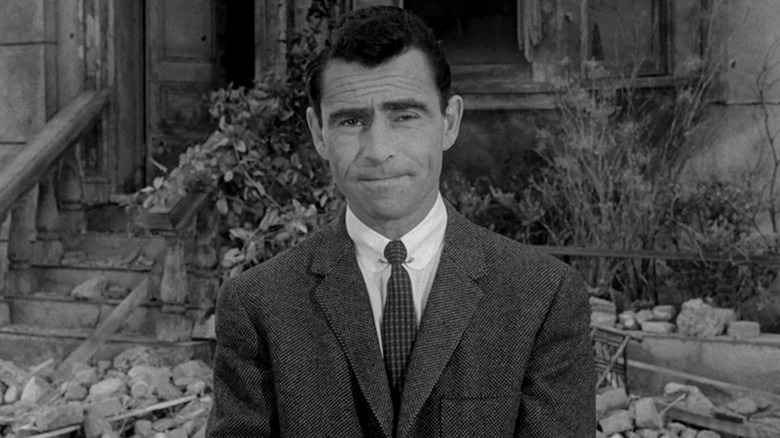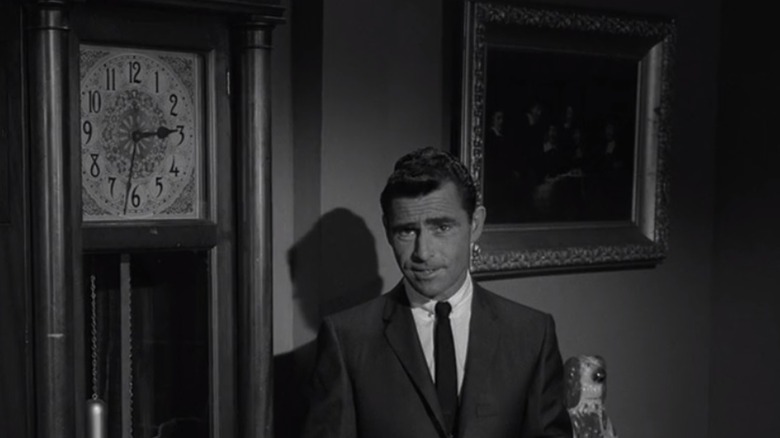Why The Twilight Zone Is Not A Sci-Fi Series, According To Rod Serling
The original run of "The Twilight Zone" — between October 1959 and June 1964 — remains inimitable. Series creator Rod Serling helped create an anthology model that featured short, impactful episodes with twist endings, each one of them unified by the surreal allure of the titular liminal space. To venture into the Twilight Zone was to experience the bizarre and macabre, which often took on the appearance of mundanity to deceive unsuspecting travelers. While some episodes are unconventional morality tales that caution against the evils of consumerism or the price of hubris, others take mysterious turns and propose thought-provoking "what-if" scenarios. Although "The Twilight Zone" ventures beyond a singular genre, its memorable offerings have always been considered science fiction.
Sure, not every "Twilight Zone" story follows the conventions of this genre, but the shared connection to this liminal space creates a commonality that cannot be ignored. Some science fiction stories, like "The After Hours," explore the horrors of embracing human identity. Others — like the brilliant pilot episode, "Where Is Everybody?" — make a case against acute human isolation. There are evolving tints to these sci-fi stories, such as "Walking Distance," a deeply personal reflection for Serling, or the absurdly unfunny "Mr. Dingle, The Strong," which unfolds as an alien storyline gone terribly wrong.
However, Rod Serling does not agree with the general view that "The Twilight Zone" is solely a sci-fi show. Despite the occasional presence of aliens and time travel, he once told The Modesto Bee (via MeTV), "This is not science fiction; this is sheer fantasy we're doing."
Rod Serling originally pitched The Twilight Zone as a fantasy series
Although the sheer influence and legacy of Serling's series is undeniable today, it was not easy to sell the idea of an anthology series that dabbled in such distinct, pressing themes. In an interview with "Fort Worth Star-Telegram," Serling talked about his pre-CBS days, and how difficult it was to pitch "The Twilight Zone" as a fantasy series that challenged definitions of what was deemed acceptable for network television. "I tried to sell this idea three years ago and I was booted out," he said. "Fantasy used to be a dirty word in TV."
Serling's own feelings about fantasy and sci-fi can be gleaned in the season 3 episode "The Fugitive," in which he distinguishes between the two genres in his classic opening narration. He posits sci-fi as "the improbable made possible," and fantasy as "the impossible made probable." He then proposes a melding of these genres within the episode's framework, stating that this union marks a journey "into the heart of The Twilight Zone."
While Serling might have started off envisioning the series as fantasy, the nature of its genre-defying episodes must have compelled him to re-evaluate his stance — though he still shied away from the "sci-fi" label:
"It's difficult to give a genetic classification, a single definition of the series. I guess you can say it's stories of imagination. They all tilt from the center — unreal, told in terms of reality. No, they're not vehicles of social criticism. They're mature adult stories."
Well, rigid genre classifications hardly matter in the face of such electrifying tales of mystery and beyond. You can classify "The Twilight Zone" as speculative fiction, but it seems that its very aim has always been to defy expectations.

